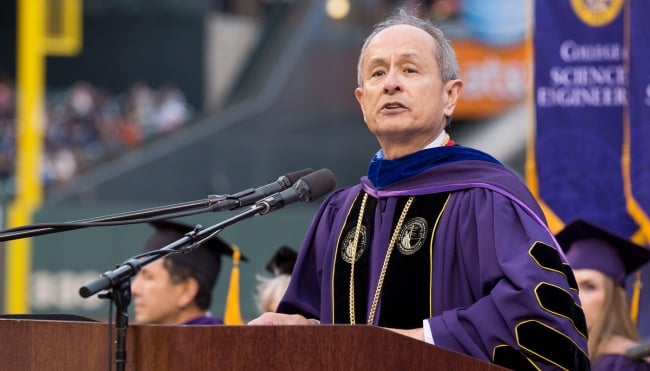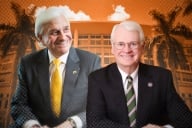You have /5 articles left.
Sign up for a free account or log in.

Les Wong, a Connecticut College trustee with years of higher education leadership experience, including past executive stints, was tapped as interim president of the college.
Connecticut College/Facebook
Connecticut College last week named trustee Les Wong interim president to replace Katherine Bergeron, who is stepping down at the end of June in the wake of a fundraising fiasco that prompted campus protests earlier this year.
Faculty are not happy with the choice. They don’t question Wong’s credentials; he previously led San Francisco State University and Northern Michigan University and served a stint as interim president of the University of Southern Colorado. But some have raised concerns about the interim search process, which engaged a firm co-owned by a fellow member of the Board of Trustees. Allegations of antisemitism from Wong’s time as president of SFSU have also entered the conversation.
Now faculty are questioning Wong’s appointment due to a process that they say ignored their voices.
The Controversy
Bergeron, who assumed the presidency of Connecticut College in 2014, announced her resignation in March after weeks of student protests related to a fundraiser scheduled at a Florida venue that has long been accused of discrimination. While the event was ultimately canceled, the controversy led to the resignation of the college’s dean of institutional equity and inclusion. It also prompted students to occupy an administrative building and unearthed faculty concerns about Bergeron’s leadership.
Bergeron faced weeks of student protests, a no-confidence vote from faculty, an editorial in the local newspaper calling for her resignation and accusations by the former dean that she had created a “toxic administrative culture of fear and intimidation” at the college. Pressed from all sides, Bergeron resigned, acknowledging missteps related to the fundraiser.
Now faculty members, who believe that shared governance eroded under Bergeron, are arguing that the search for her successor lacked transparency. It was conducted by search firm Spencer Stuart, which trustee Karen Quint co-owns. (Spencer Stuart had previously worked with the college in 2013 when it hired Bergeron, a year after Quint—a search firm partner and Connecticut College graduate—joined the board.)
A small group of Connecticut College faculty members who requested anonymity told Inside Higher Ed they felt shut out of the process to select an interim and feared that Wong’s appointment may have been predetermined. They said by email, “The willful disregard of faculty perspectives by the Board seems like retaliation for the vote of no confidence we took in the president. There has been NO transparency let alone adequate transparency.”
Faculty have also raised questions about the unclear cost of the search for an interim.
“The Board will not divulge the amount given to Spencer Stuart. It is hard to understand why the Board would pay a search firm to ultimately hire a member of their own governing body,” the email said, noting that presidential searches often add up to tens of thousands of dollars.
Quint did not respond to a request for comment, and a college spokesperson did not provide details on the arrangement between the institution and Spencer Stuart. The spokesperson, John Cramer, declined to answer how much the college paid for a search that elevated a trustee to interim president, but he did note that the firm was used only for the interim presidential search.
In an emailed statement, Cramer pointed to Wong’s lengthy résumé, which spans “nearly five decades in higher education.” Cramer also described Spencer Stuart as “one of the most reputable executive search firms in the world.”
Cramer noted that Quint had recused herself from the interim search process and will be stepping down from the Board of Trustees on June 30, when her term as vice chair ends.
Regarding the search for the next president, Cramer said that the board “has solicited proposals from several national executive search firms that specialize in higher education and has established a process to evaluate and narrow those proposals to the ones that best serve Connecticut College. The Committee plans to make a selection in the coming weeks.”
Following news of Wong’s appointment, publications serving Jewish audiences raised concerns about accusations of antisemitism leveled at him while he was president of San Francisco State. Both Jewish and Muslim groups argue that neither received adequate support from Wong as issues between Israel and Palestine spilled out onto campus.
Wong has addressed those concerns in the past, arguing he was unprepared to grapple with those cultural tensions. He later apologized to students for his insensitivity in addressing such delicate issues.
Cramer said that trustees “considered the entirety of his tenure at SFSU and determined that when difficult issues arose on campus, they were handled professionally, including through extensive direct dialogue with the affected parties. These efforts allowed concerned parties to be heard, provided accountability and enabled the university to move forward.” Ultimately, upon a review of Wong’s time at San Francisco State, trustees “determined that he led with distinction, integrity and professionalism to heighten understanding and acceptance on campus.”
Now, despite the vindication from fellow trustees, Wong will step into a leadership role at a campus that is still reeling from the fundraiser gaffe at a venue long accused of antisemitism, making the subject particularly sensitive at Connecticut College.
Unpacking the Conflict
Hiring Spencer Stuart to lead Connecticut College’s interim president search appears to be a clear conflict of interest for Quint, said Thomas Bakewell, a management consultant, former trustee of Lindenwood University and author of the book Claiming Your Place at the Boardroom Table: The Essential Handbook for Excellence in Governance and Effective Directorship.
“I would say that this would absolutely be a conflict of interest. But in the same breath, I would also tell you that sooner or later, everybody has a conflict of interest. So the real question becomes how is it dealt with and has it been properly disclosed to all fellow board members?” Bakewell said.
In accordance with best practices, Bakewell argued that Quint would need to disclose her conflict of interest and that the Board of Trustees would then need to independently review it.
“Some people may not like it, but I’d argue no harm, no foul if it’s within the bounds of propriety,” Bakewell said.
He also emphasized the importance of established policies and regular board training.
“Every good board should have policies on conflicts of interest,” Bakewell said.
How the private college navigated the conflict of interest question is unclear, though Cramer said that Quint has not voted on matters related to Spencer Stuart. Connecticut College, for its part, has sought to minimize Quint’s role in the Spencer Stuart hierarchy, noting that she “is one of about 250 partners” at the employee-owned search firm.
Faculty members told Inside Higher Ed that they raised concerns about a conflict of interest in a May meeting with trustees, but the board “seemed to believe that it was not a conflict since Karen herself was not involved in the search committee for the interim President. This doesn’t change the fact that her firm is receiving money from the college while she is a Board member.”
Faculty members also noted that they are withholding judgment on Wong as an interim president. The issue, they said, isn’t with Wong as a leader but rather with a search process that excluded faculty, continuing an erosion of shared governance that—among other issues—led them to vote no confidence in Bergeron in March.
“Some of the media coverage seems to have turned towards issues of Dr. Wong’s past,” faculty members wrote in the email. “Perhaps some of the nuance is lost in that coverage so we reserve any judgment on Dr. Wong personally and wish him success in bringing together the college community. However, the circumstances under which this appointment was made leave us feeling betrayed and sidelined, yet again. The Trustees have shown no respect for shared governance or faculty/staff expertise, and in turn inspire very little confidence in the rest of us.”








